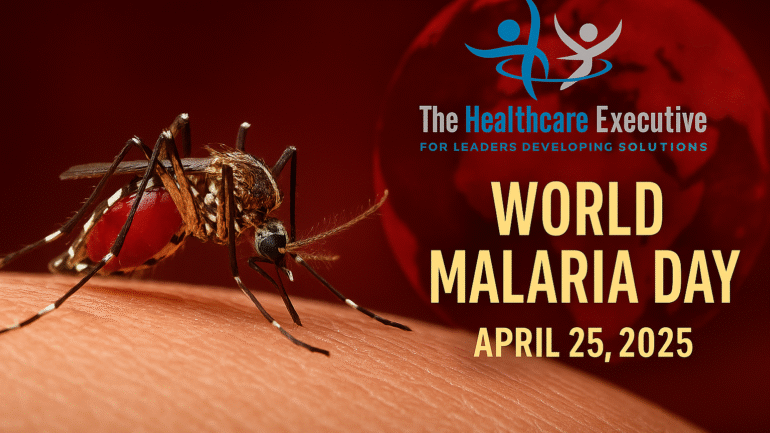World Malaria Day – April 25, 2025

- Posted by Greg Wahlstrom, MBA, HCM
- Posted in Health Observance Calendar
Combating a Global Killer: Health Systems on the Frontline of Malaria Prevention
Published: April 25, 2025
Each year on April 25, World Malaria Day serves as a global reminder of the urgent need to combat one of the deadliest infectious diseases still impacting communities worldwide. With over 600,000 deaths annually—most of them children under five in sub-Saharan Africa—malaria remains a critical public health challenge. The World Health Organization (WHO) has emphasized that coordinated prevention efforts, surveillance, and access to treatment are key to reducing malaria’s burden. In 2025, this day carries added significance as climate shifts and mosquito resistance evolve, placing even more pressure on healthcare systems. Executive leaders across global health organizations are being called to not only scale up interventions but also ensure resource equity in high-burden countries. Strategic partnerships like the RBM Partnership to End Malaria highlight the importance of multi-sector collaboration. Malaria is not just a medical crisis; it is a developmental and economic obstacle that undermines productivity and health equity. Forward-thinking hospital systems are joining the cause by supporting vector control research and sponsoring global supply chain initiatives for anti-malarial medications. As executive leaders, now is the time to view malaria eradication not just as a public health objective, but as a global healthcare mandate. Thus, strategic innovation and equity-driven leadership are central to success.
For health executives, World Malaria Day presents an opportunity to align institutional efforts with the global fight against vector-borne diseases. U.S. hospitals and health organizations are participating in global partnerships, technology transfers, and education campaigns, positioning themselves as agents of global health diplomacy. For example, Cleveland Clinic recently partnered with university researchers to fund vaccine trials aimed at reducing malaria mortality. Additionally, Children’s National Hospital is using telehealth tools to support remote diagnostics in regions with limited laboratory infrastructure. These efforts serve as strategic extensions of institutional missions while enhancing brand credibility and philanthropic outreach. Malaria doesn’t stop at borders, and healthcare leaders must take an active role in building resilience across health systems globally. Whether through data-sharing platforms, remote clinician training, or portable diagnostics, hospital systems can embed global impact into their local footprint. In doing so, they contribute to lowering the malaria burden and reinforcing their leadership as part of the global health security agenda. With deliberate action, hospitals can become powerful catalysts in the elimination of malaria.
As we navigate the evolving dynamics of infectious disease control, World Malaria Day also emphasizes the significance of digital transformation and data-informed decision-making. Leveraging geospatial mapping tools, predictive analytics, and mobile platforms is now essential in tracking outbreaks and deploying targeted interventions. The use of real-time surveillance data enables faster response mechanisms and smarter allocation of limited resources. Executives at organizations like PATH are advancing AI-powered diagnostic tools that minimize human error and facilitate faster treatment delivery in rural settings. Likewise, Mass General Brigham is investing in global health fellowships and predictive analytics to advance clinical interventions in endemic zones. These approaches reveal how digital transformation—when tied to strategic leadership—can dramatically shift the global malaria response. Strategic funding, interoperability, and cloud-based monitoring are not just buzzwords but essential tools in the eradication arsenal. Healthcare systems that integrate these technologies into broader infectious disease protocols will be better positioned for global health leadership. This is not just innovation for innovation’s sake—it is innovation for survival.
In 2025, the World Health Organization’s call to “Accelerate the fight against malaria for a more equitable world” places renewed focus on health justice and resource mobilization. Healthcare systems are uniquely positioned to respond—not just with philanthropy, but with scalable, sustainable infrastructure and expertise. Executives can lead campaigns to fund long-lasting insecticidal nets, support emergency stockpiles of anti-malarials, and establish field hospitals equipped for rapid response. Additionally, board-level governance can advocate for participation in multilateral health initiatives and embed malaria eradication within sustainability and ESG frameworks. The global community must act decisively to avoid the resurgence of this deadly disease, particularly in conflict zones and areas affected by displacement. Leadership in this context is defined not just by compassion, but by preparedness and global citizenship. Executive-level commitment to malaria control today will shape global health stability for years to come. Ultimately, eradicating malaria is not a question of possibility—it is a question of will.
Looking ahead, World Malaria Day 2025 is more than a commemoration—it is a leadership call to action. Healthcare executives, board members, public health administrators, and private sector stakeholders must work in concert to drive impact. This includes investing in innovation, supporting the global health workforce, and ensuring equitable access to life-saving tools. Your leadership matters in the fight against malaria—because leadership saves lives. The implications extend far beyond vector control; this is about shaping health outcomes for future generations. Cross-sector partnerships, community-based engagement, and smart technology all have roles to play. The Healthcare Executive community urges all decision-makers to recognize that silence is complicity in the face of a preventable disease. Malaria may not be prevalent in U.S. hospitals, but it is a global issue that demands local leadership. Now is the time to act decisively, collaboratively, and globally.
Discover More:
Explore how health systems are engaging with global health challenges and prevention strategies.
Internal Links
- World Tuberculosis Day 2025: Leadership in Disease Elimination
- World Leprosy Day 2025: Unite, Act, Eliminate
- Black Maternal Health Week 2025: Advancing Equity in Care



